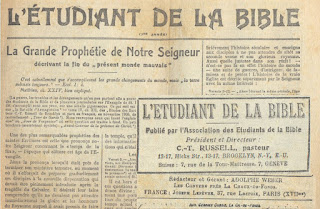The caption reads Photo Drama of Creation - Drill Hall Merthyr - October 10th - 17th, 1915
The United Kingdom is made up of four countries, England, Scotland,
Ireland (just the northern part since 1921) and Wales. When the Bible Student
message came to the United Kingdom and groups of supporters formed, it appears
that Wales was the last to be reached in any meaningful way.
The first mention of Wales in the pages of ZWT was in 1891. CTR visited
the UK and spoke in London and Liverpool, to an audience of about 150 at both
places. The report in the November 1891 ZWT mentioned the Liverpool audience
included some from Wales. Geographically that would probably be individuals from
North Wales. (Before communications increased, North and South Wales were
almost like different countries, with a different dialect, and even today, to
travel from one to the other, it is usually quicker to go through England.)
In 1900 the British Branch was established, and as reported in ZWT for
May 15, 1900 this was the benefit of the friends from England, Ireland,
Scotland and Wales.
The December 15, 1904 report from the UK, written by Jesse Hemery, gave
some specific information about progress in the UK including Wales. Hemery
wrote that congregations in England, Scotland and Ireland had increased over
the last seven years from four to forty. By his estimate that would mean only
four established congregations in 1897, but now forty in 1904. None of these
were in Wales, but Hemery wrote: “You
will be glad to know that Wales is now getting its share of the harvest
blessing: several colporteurs have been working in South Wales”.
There was a great religious revival in Wales in 1904-1905, the results
of which were felt for many years thereafter. How much this contributed
towards, or even hindered, the progress of the Bible Student message is an interesting
question.
In 1906 American Benjamin Barton made a Pilgrim visit to Britain. He visited
all the congregations and groups he could in Britain, and for the first time, a
group in Wales was mentioned. Cardiff received a visit in the August. This then
was the first documented congregation in Wales.
The 1906 report, written as usual by Hemery (in ZWT January 1, 1907),
states that “considerable work has been done in Wales and Ireland, in both of
which there is now a considerable and growing interest.”
In 1907 A E Williamson made a similar Pilgrim visit and his itinery
(found in ZWT for June 15, 1907) included Cardiff, and also Bangor in the north
of Wales.
In 1909 (WT November 15, 1909) a letter in support of the Vow was
published from “we the undersigned members of the ‘Ecclesia’ in Cardiff”. It is
signed by fifteen.
Things really took off in Wales after a visit by CTR in 1911. He
visited Wales twice, speaking at South Wales venues in Newport, Cardiff,
Swansea and Llanelli. There would normally be existing groups of Bible Students
or at least committed individuals already in places to pave the way and
organize events and publicity. So we can assume that along the South Wales
industrial areas there were now several regular gatherings in place. Fifteen
hundred attended a meeting in Cardiff at the Park Hall theater. Russell would
later comment in the December 15, 1911 Watch Tower “the truth is making good
progress in Wales.”
In conjunction with his visits in 1911, a South Wales newspaper, The
Weekly Mail started printing Russell’s sermons each week, and this would extend
the outreach of the message up the Welsh valleys, supported by the colporteurs.
So by World War 1 there is anecdotal evidence - but strong anecdotal
evidence - that there were established congregations in places such as Newport,
Cardiff, Pontypridd, Abersychan (Pontypool), Merthyr Tydfil, Beaufort (Ebbw Vale),
and Clydach (Swansea).
What about literature in the Welsh language?
The first documented evidence of Welsh language literature is in WT
November 15, 1911, which mentions free literature being available in 23
languages, including Welsh. This would be copies of Bible Students Monthly or
People’s Pulpit.
This was probably produced more for an American audience. According to
the Wales-Pennsylvania project, at one point one-third of the population of
Pennsylvania was Welsh - people who left Wales to take their skills in coal mining,
slate quarrying and iron working to industrial centers like Pittsburgh in the
19th century. Even today there are 200,000 people of Welsh ancestry
in the State. So there were Welsh Bible Students in America from very early on,
and no doubt some of these sowed seeds with relatives back in the old country. For
one particularly example see an old article on this blog about William Hickey,
who originally came from Tredegar, South Wales. He was attending meetings with
CTR way back in the 1870s.
Paradoxically, the large numbers who became adherents in South Wales probably
didn’t speak or read much Welsh, because genetically they were not Welsh. Vast
numbers of English from Somerset, Gloucestershire and the Midlands flocked into
South Wales during the Industrial Revolution, and as the iron ran low in places
like Merthyr, Spanish iron and Spanish workers were imported along with it. In WT
May 15, 1911, CTR even commented, “Cardiff has largely an English population. The
proportion of Welsh faces, both at the public address and the address to the
friends, was comparatively small.”
In 1915 the Photodrama of Creation came to South Wales. It was shown in
Merthyr Tydfil in October 1915 and a surviving photograph is at the head of
this article.
It is interesting that Merthyr saw the Photodrama before Cardiff did.
However, for a long stretch of its history Merthyr was the largest town in
Wales, with its huge iron works. Cardiff was the port at the end of the canal,
and later the railway, to export the riches of the valleys.
![Falcon's Crown: Kidnapped [e-book edition]](https://blogger.googleusercontent.com/img/a/AVvXsEhkBe00FOeBBmYbVCCTcdazS0iVnLd1WDFAqgsN2RZ54_2mWSQGowpbpnwmDREb-FVVk6AGpaGBEGezxxmeNm1qq65js_RZsBYwu6E6-3ucp3_YQyONvEK3NuIInA3Ru_cqrfm_JizezcrwPiewPQwunSXPJG1OI38N9mQwxOeGd4SvcPUf-DtO7FLMVcg=s238)
























































